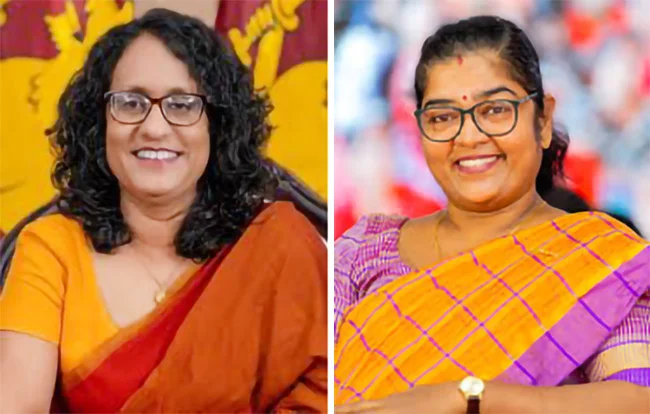Features
The future is female

by Farzana Haniffa

Today, nearly two years after, I want to revisit some of the points made there in relation to recent political changes. After the election of the current government, with the participation of an array of women leaders, and the mobilization of a constituency, specifically identified as women, there is much to assess and a lot to celebrate. In the long road towards addressing the violence and misogyny in our society, the improvements in women’s leadership in Parliament is significant. I argued back then that young women, who graduate from university, enter a world where women face a significant threat of violence. I suggested that they needed to be equipped to both face as well as transform such a world. Such a transformation requires that women take on greater leadership roles. The new government has enabled the beginning of such a transformation through supporting a significant number of competent and experienced activist women to enter Parliament. This column would like to recognize and endorse this transformation and speculate as to what this might mean for our female student population today.
As Gamage and Dassanayake recently pointed out in Himal South Asian, the NPP actively mobilized women voters in a manner that was substantively different from earlier attempts. They mobilized women, highlighting women’s unpaid care work and the gendered nature of discourses regarding women’s bodies. The NPP capitalized on the fact that women in Sri Lanka who had already made great strides in other spheres were quite ready to assume leadership in politics. (Women’s groups had been agitating for decades for greater representation in government). Coming into the general elections of 14th November, 2024, the NPP nominated 36 women candidates, and 20 of them were elected. The numbers of women in Parliament—never more than a paltry 5% of the legislature since independence – is now almost 10%. However, the party’s nonrecognition of these women’s capabilities for greater leadership in the Cabinet and as Deputy Ministers was disappointing. Only two women Harini Amarasuriya, Prime Minister and Minister of Education, and Saroja Paulraj, Minister of Women and Child Affairs, were considered worthy of leadership in the Cabinet.
Our Parliament, long a (Sinhala) male bastion, has hardly been exemplary of the leadership needed for the country. It has rarely been a place that women and sexual and gender minorities have been able to have their voices heard. Victorian era laws banning same sex sexuality remain in the law books. The Muslim Marriage and Divorce Act-MMDA, a problematic relic from the 1950s, has been left unchanged for decades. Any women-friendly legislation has been hard fought. In fact, Parliament has been the locus of some of the most discriminatory, dismissive and derogatory discourse on women. (The nature of parliamentary speech regarding women has been documented by the Women and Media Collective in a 2016 publication.) While it remains too early to speak of legislation, there is at least a discernible difference in the parliamentary discourse on women as a result of the contribution by the new women MPs. Additionally, some of the female MPs’ contributions have led to substantive debates on issues ranging from debt restructuring to social protections.
In her maiden speech, NPP MP Kaushalya Ariyarathne asserted that the country depended on the labour of women but gave them few rights and privileges and subjected them to abuse. She reminded the Chamber of the many laws that needed amending in relation to the discrimination faced by women, as well as bisexual and gender minorities. She referenced the failure to amend the MMDA and the inability to bring about legislation to control micro-finance, as issues the previous political regimes needed to account for. NPP MP Lakmali Hemachandra, arguing against the portrayal of the government’s decision to not renegotiate with the IMF as a continuation of the Wickremasinghe agenda, reminded the Chamber that the goal of the current government was not to further burden the citizenry but to encourage the greater participation of those who were pushed out of economic activity in the past years. Regardless of what position we may hold on the IMF reforms, and regardless of our critique of government policies, Ariyarathne and Hemachandra’s (and others’) elevation of discussions in Parliament to the substantive issues facing the country should be recognised.
Harini Amarasuriya, in addition to being the Premier, is also Minister of Education. In keeping with her long years of activism in the education sector, if Amarasuriya is able to improve our struggling education sector, her contribution will be significant, not just for future generations of students but also for women’s leadership. Saroja Paulraj, in charge of the Ministry of Women and Child Affairs, too, has a challenge. The Women’s Ministry generally assigned the herculean task of addressing all issues related to women, experienced a 50% budget cut under the last government and has traditionally enjoyed very little substantive support to carry out its responsibilities. It has long lacked the transformative feminist potential needed for substantive change and it has been providing little more than social services. It is hoped that under this government, with Amarasuriya, Paulraj and the other women leaders of the NPP that worked for women’s political mobilization, this will change. The Ministry must reflect the progressive ethos that the women leaders of the NPP have cultivated and Paulraj must have the space to bring in her own vision emerging from decades of feminist grassroots activism into the work of the Ministry. The expectations from the women in leadership positions is significant and their achieving their goals will depend on the support they have from within the government and from the public.
Responding to the presence of strong women in Parliament, social media and middle- and upper-class drawing rooms have rarely been interested in their competence or their possibly transformative impact. Peppered with praise for the change that is being promised and lived, the conversation has been mostly about the Prime Minister’s sexual orientation. In the case of the younger MPs speaking in Parliament, the response has been more virulent. Two of them have been the target of sexualized fake news reporting. In one instance, a social media account, claiming to be of an MP, state that a woman parliamentarian had sex with the said MP in a hotel in a Colombo suburb. In another, an MP’s illicit affair is reported to the Police by his spouse, citing another of the government women MPs as the individual concerned. Both social media and a prominent newspaper reported this news, naming the woman MP. There is little or no recourse for those whose names appear on such posts, and they are shared with great glee—anticipating no personal consequences. These sorts of reportage and amplification indicate a problem with the social media platforms, the lack of regulation of such abuse as well as the rampant and violent misogyny in our society.
The political leadership’s long dismissal and derogatory treatment of women has leached into our public institutions and our daily lives. The high rates of intimate partner violence in the country have been documented. (See the 2016 report by the Department of Census and Statistics). The dismissive treatment of cases of sexual and gender-based violence by the Police and other state institutions concerned with responding to women suffering abuse have also been documented. The male population in general—across class and ethnicity—seems to have no filter with regards to the nature of insults levied against women on social media and elsewhere. The media, too, has no compunctions about reporting only that which borders on the defamatory and abusive.
The world that our students will enter today, therefore remains malevolent and thick with the possibility of violence. Overturning the culture of misogyny will take law reform and regulations, as well as time. Our students therefore need to be prepared to contribute to and lead such processes in the future. However, the thoughtful and competent activists, women currently in Parliament are figures that our students can emulate and political leadership is now a possibility that all young women can aspire to. Although there is much work still to be done, there is also much to be hopeful in the new year.
(Farzana Haniffa is professor in the Department of Sociology, University of Colombo)
Kuppi is a politics and pedagogy happening on the margins of the lecture hall that parodies, subverts, and simultaneously reaffirms social hierarchies.